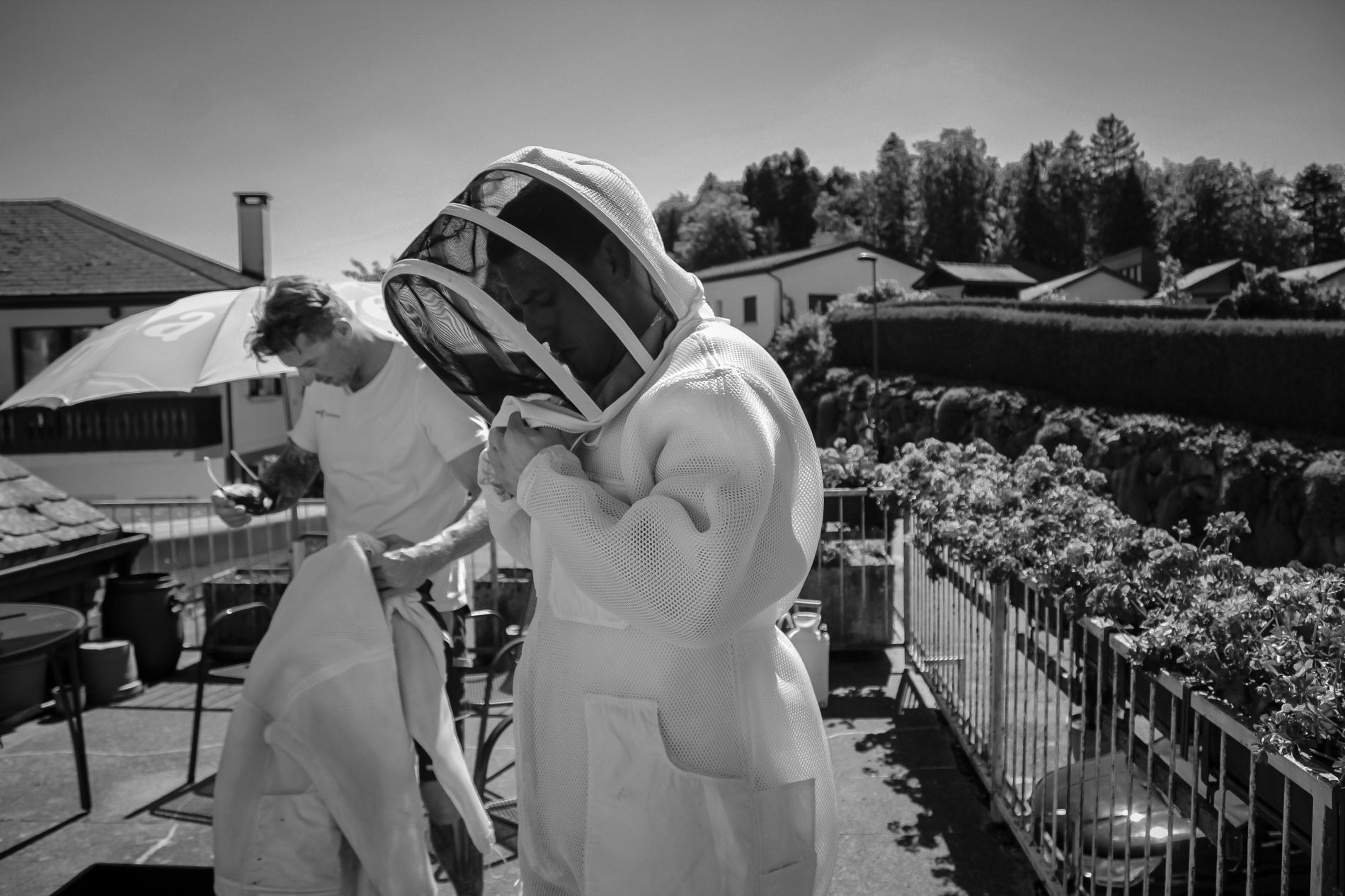
Fighting Asian hornets in Walzenhausen
Have you discovered an Asian hornet's nest? We'll be on site quickly! Call now - Daily Mon-Sun 07:00-21:30. Contact us now: 058 510 22 54
Having the Asian hornet's nest removed
Vespa velutina, a species of hornet native to South-East Asia, has spread prolifically to Switzerland and the wider subcontinent. While it poses no threat to humans, it has become infamous for its predation on honey bees, causing distress among beekeepers. A small group of these hornets can swiftly assault and annihilate a bee colony within a short time frame. If you have discovered a hornet's nest on your house, patio, shed, or in your blind box, contact our experts for hornet nest removal in Walzenhausen!
Use the uncomplicated telephone service of the Hornet experts in Walzenhausen and simply inform us at 058 510 22 54, we will be on site quickly so that you and everyone in your area feel completely safe again.
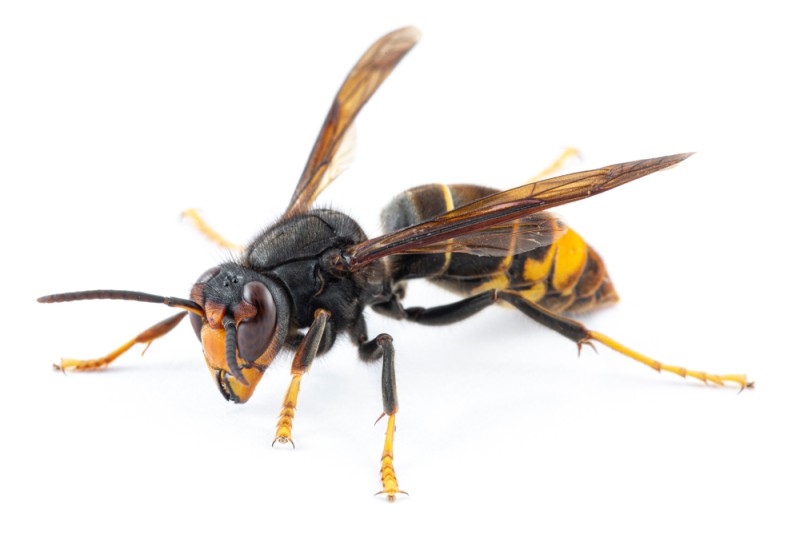

Appearance of the Asian hornet
Here are some characteristics that distinguish the Asian hornet:
1. Size: The queen can reach a length of about 3 cm, while the workers are slightly smaller and measure about 2.5 cm.
2. Color: The Asian hornet has a dark body that is almost black, with a yellow stripe at the back of the abdomen. Its face is orange-yellow.
3. Wings: The wings are dark and almost smoky gray.
4. Legs: The hornet has yellow tips on its legs, which is a striking distinguishing feature when it flies.
5. Nest: The Asian hornet's nest is often high in the trees, but it can also be found underground or in tall structures such as chimneys. It has an oval shape and is made of chewed wood, which gives the hornet a papery texture.
It is important to distinguish the Asian hornet from the European hornet (Vespa crabro), which is more harmless and a natural part of the European fauna. If you suspect you have found an Asian hornet nest near you in Walzenhausen, you should report this to the local authorities, or using our reporting form, as they can spread quickly and be harmful to bees and other insects. To avoid being attacked by the flying inhabitants, you should hire a professional pest controller such as the Hornet Experts Walzenhausen. We can identify the nest beyond doubt and take further steps to remove the Asian hornets professionally.
News about the Asian hornet in Walzenhausen
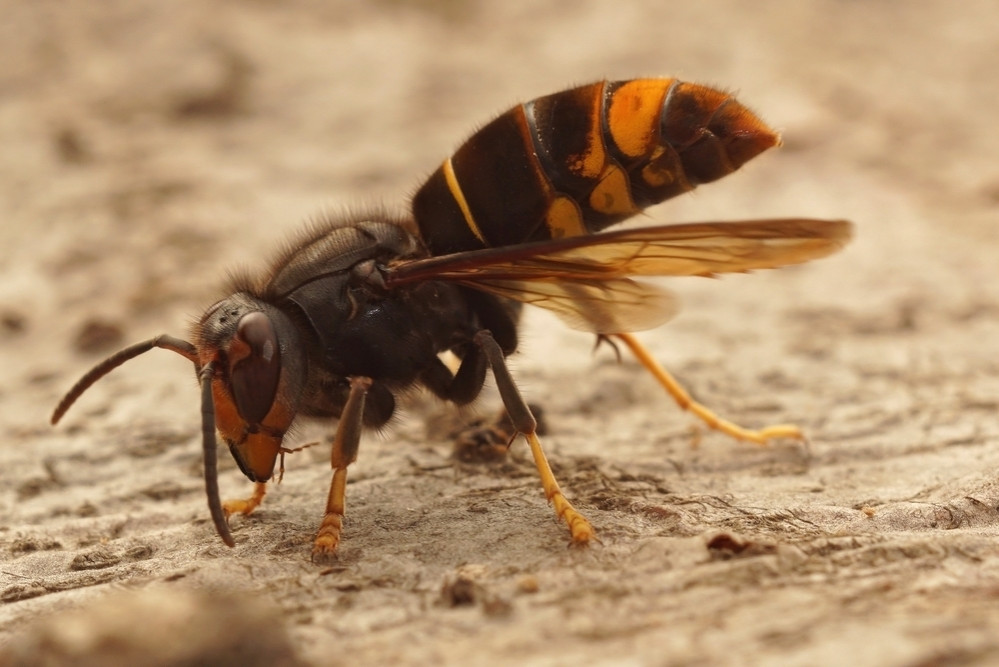
02.12.2025 Western Switzerland: Killer hornet eats bees
The territory of the Asian killer hornet has expanded considerably this year, with a notable increase reported in western Switzerland. This invasive species poses a significant threat to native bee populations, as bees make up the majority of its diet. The potential consequences are serious. Moreover, the hornet represents a danger to individuals with allergies to its venom.
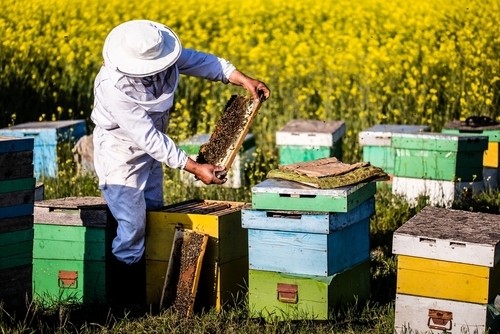
25.11.2025 Serious concerns about the bee population!
Asian hornets are inflicting significant harm on beehives across multiple parts of Europe, as reported by local beekeepers. Even a small number of hornets can destroy an entire bee colony within hours. This sharp decline in pollinators could have serious consequences for pollination, local ecosystems, and agricultural productivity.
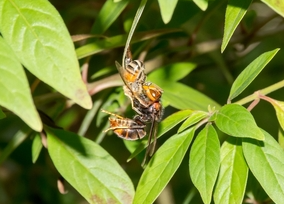
18.11.2025 Asian hornet doesn't just eat bees!
The danger it presents to insects is substantial!
The Asian hornet feeds largely on honeybees—up to 85 percent of its diet—alongside beetles and flies. This high level of predation not only poses difficulties for fruit growers but also further threatens already vulnerable bee populations.
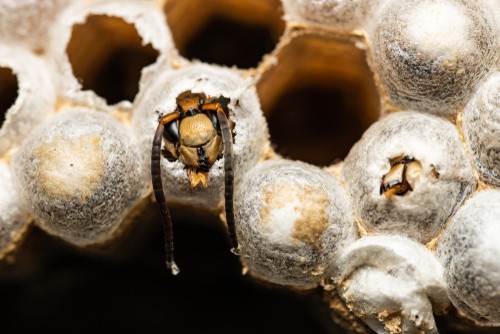
11.11.2025 How did the Asian hornet get to Europe?
The Asian hornet likely arrived in Europe unintentionally and has quickly expanded throughout France and nearby countries. Its adaptability to different environments and the absence of natural predators have contributed to its rapid spread. A single nest can generate several hundred new queens in one breeding season.
Asian Hornet Reporting Form
Please fill out all required fields and submit the form.
Help us!
If you discover an Asian hornet or a nest of this invasive species in Walzenhausen, it is of the utmost importance that you report it immediately. The Asian hornet is not only dangerous to humans, but also poses a serious threat to native bee populations and the ecological balance in Switzerland.
Why is it important to report the find?
Once it takes hold in a region, the Asian hornet has a significant impact on the native insect population, honey bees being especially vulnerable. Through their predation on bees, these hornets instigate a decline in pollinator populations, thus affecting the well-being of local flora and agricultural production. By reporting sightings, experts can react quickly, remove the hornets or their nests and thus prevent the spread of this invasive species.
Notification form for sightings
The successful regulation of the Asian hornet's overpopulation in Switzerland and the protection of our native insects rely on your support. We encourage you to report any suspicions or sightings using our designated reporting form. Together, we can ensure an early and effective intervention to minimize the potential spread of this threatening species in our ecosystems.
Your contribution is crucial in the fight against the Asian hornet in Walzenhausen. Together we can protect nature and maintain the balance of our ecosystems;
Thank you for your vigilant attention and your commitment to protecting our environment.
How dangerous is the Asian hornet?
The Asian hornet (Vespa velutina) is a predatory insect that originated in Asia and has spread in recent years to various parts of Europe, including France and now also Switzerland and in Walzenhausen. Although it poses a threat to honey bees and native biodiversity, it is generally no more dangerous to humans than other wasp species. Nevertheless, there are some aspects to be aware of:
1. Threat to honey bees: The Asian hornet preys on honey bees, threatening native bee populations. A decline in bees can have a negative impact on pollination and thus on local flora and agricultural production.
2. Stings: As with other wasp and hornet species, the stings of the Asian hornet can also be painful. For most people, the stings are unpleasant but not dangerous. However, people who are allergic to wasp or hornet stings can suffer a severe allergic reaction, which in the worst case can lead to anaphylactic shock.
3. Aggressiveness: Although the Asian hornet is not necessarily more aggressive towards humans than other wasp species, it can become aggressive if it feels threatened, especially near its nest.
4. Ecological effects: Apart from the direct effects on honey bees, the spread of the Asian hornet can also disturb the ecological balance by affecting the populations of other insects.
Differentiating between the Asian hornet and the Asian giant hornet (*Vespa mandarinia*) is crucial. The aptly named "killer hornet" possesses a larger body and more potent venom, making it potentially more hazardous to humans.
If you have discovered a nest, call us immediately: 058 510 22 54
Our hornet professionals in Walzenhausen are certified by the VSS.
Frequently Asked Questions About Asian Hornets in Walzenhausen
Renowned for its ability to inflict stings that can have potentially severe or fatal consequences, the Asian hornet is considered a much more dangerous insect compared to most other hornet species.
Recognized for its imposing proportions, the Asian hornet is a sizable stinging insect that reaches lengths of up to 3 cm. Its narrow black body is intensified by vibrant stripes in a rich fusion of orange, yellow, and black.
Typically displaying a reserved and gentle temperament, the Asian hornet can swiftly adopt an active and aggressive stance when it perceives danger or feels cornered, deploying its defense mechanisms.
The Asian hornet is venomous to humans, as its bites can cause pain and have the potential to elicit allergic responses.
The Asian hornet is a hazardous insect owing to its poisonous sting. The pain it induces is more intense than that caused by other wasps, and it can provoke allergic responses.
If you come across an Asian hornet and want to report it, ensure you contact either a regional officer specializing in the protection of wild bees or an agency associated with the responsible Ministry of Agriculture.
To prevent attacks and mitigate the spread of Asian hornets, it is important to report their presence. This type of insect is known for being remarkably territorial and aggressive.
When Asian hornets are present in Switzerland, it becomes crucial to arrange for professional hornet control measures. Calling upon a pest control service is recommended for appropriate action.
No specific protection is assigned to the Asian hornet, emphasizing the importance of tightly monitoring their populations to impede their potential spread.
Hibernating Asian hornets can be found adopting one of two patterns: either hibernating collectively in colonies nestled in the corners of walls, buildings, garden sheds, chance houses, or tree hollows, or hibernating solo in those very areas.
Would you like more information about Asian hornets? Then take a look at our FAQ's about Asian hornets.
Private inquiry form
For an uncomplicated request to remove an Asian hornet's nest, please use our contact form for private individuals.
Real estate inquiry form
Use our property management order form to request the removal of an Asian hornet's nest.




_20.jpeg)
_17.jpeg)
_15.jpeg)
_18.jpeg)